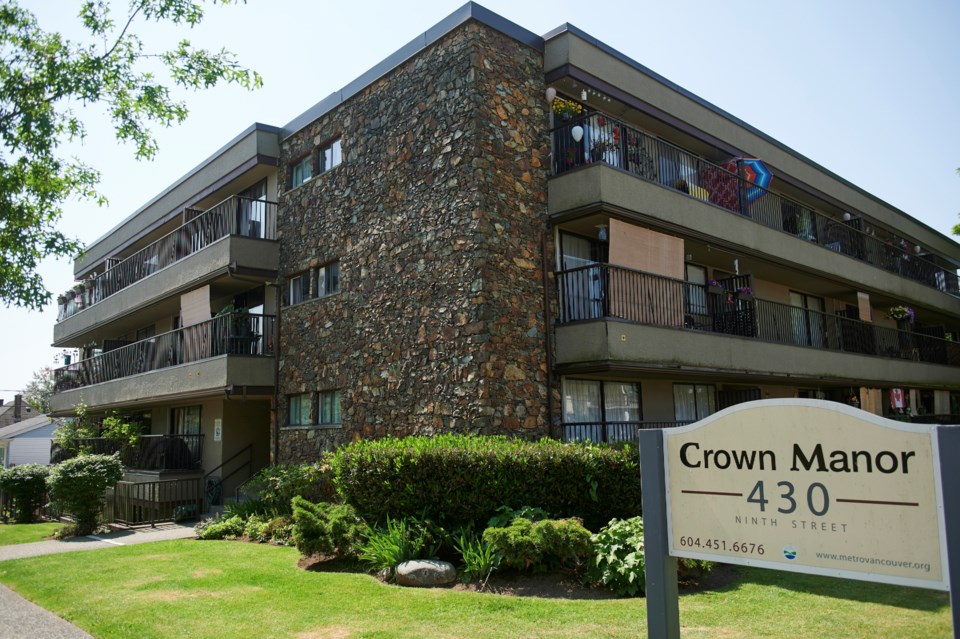A New West apartment is among six buildings targeted for retrofits aimed at improving the lives of residents and benefitting the environment.
The province, along with BC Housing, the City of Vancouver, the Metro Vancouver Housing Corporation, the BC Non-Profit Housing Association and the Pembina Institute, have announced the next stage in the Reframed Lab initiative, a building retrofit design program launched in June 2020. Six design teams have been selected to develop retrofit designs for six low- to mid-rise social housing buildings in New Westminster, Kamloops, Coquitlam, North Vancouver, Vancouver and Victoria.
Williams Engineering Canada will develop retrofit designs for Crown Manor, a building that’s operated by the Metro Vancouver Housing Corporation. The 29-unit building is located at 430 Ninth St. in the Brow of the Hill neighbourhood.
A press release from the Ministry of Attorney General states the six design teams will exchange ideas on cutting carbon pollution (including technological solutions such as heat pumps, heat-recovery systems and low-carbon materials) and driving down energy demand and improving climate-change resiliency. They’ll also explore innovations in seismic upgrades and on-site solar generation.
“The buildings' tenants will not be displaced from their homes during renovations, as most of the work will be on the buildings' exteriors,” said the press release. “Work is scheduled to begin in fall 2022.”
The buildings selected for retrofits range in size from 11 to 50 units. All totalled, they provide 189 units of housing for families, seniors and people living with physical disabilities, mental-health and substance-use challenges.
According to the province, residents of these six buildings will soon benefit from renovations that will make their homes safer, more energy-efficient, less polluting and more resilient to extreme weather.
"The climate emergency has arrived, and people living in non-profit housing are among the most vulnerable to its impacts,” said Jill Atkey, CEO of the BC Non-Profit Housing Association. “At the same time, the non-profit housing sector is one of the largest energy consumers in B.C. The six projects announced today will help us develop a path forward to ensure people are protected and our footprint is reduced."
The Ministry of Attorney General says the retrofit projects aim to reduce annual energy demand by more than 50% and carbon emissions by approximately 80%. Upgrades to the building envelope are intended to reduce thermal heat loss, drafts, moisture and mould buildup, which will reduce utility costs and improve indoor air quality.
The Pembina Institute, a nonprofit founded in 1985, provides research, analysis and recommendations to inform policies and practices related to energy.
"In the midst of a climate emergency, B.C. has an opportunity to lead the world with local know-how and products for the renovation wave that will be required in all cities,” Tom-Pierre Frappé-Sénéclauze, B.C. director for the Pembina Institute, said in a news release. “With careful design, deep retrofits not only reduce energy bills and carbon pollution, but they can bring health benefits, resilience to climate risks, increased seismic resistance and extended life for our crucial housing infrastructure."
The province is supporting the design and capital costs of this project through funding from the Capital Renewal Fund, a 10-year $1.1-billion investment intended to preserve and improve B.C.'s 51,000 units of social housing. This initiative has also received $460,000 from the province's CleanBC Building Innovation Fund.
Follow Theresa McManus on Twitter @TheresaMcManus
Email [email protected]


